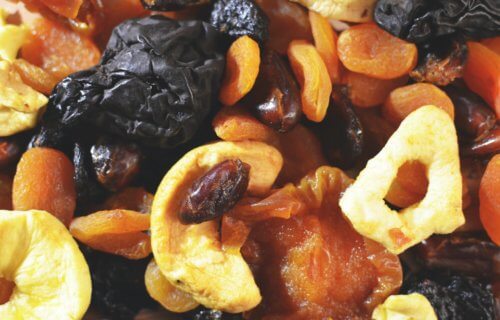UNIVERSITY PARK, Pa. — Making homemade stuffing during the holidays? A new study suggests throwing some dried cranberries and apples into your recipe. Researchers from Penn State University say people who consume dried fruit are in generally better health. They also take in more key nutrients and calories on days they add a dried snack to their menu.
“Dried fruit can be a great choice for a nutritious snack, but consumers might want to be sure they’re choosing unsweetened versions without added sugar,” researcher Valerie Sullivan says in a media release. “Portion sizes can also be tricky, because a serving of dried fruit is smaller than a serving of fresh since the water has been taken out. But the positive is that dried fruit can help people potentially consume more fruit because it’s portable, it’s shelf-stable, and can even be cheaper.”
The study finds poor diet leads to almost half of the deaths caused by heart disease in the United States. Most of these diets lack the proper daily amounts of fruit. Meanwhile, eating fruit provides the body with several nutrients including fiber, potassium, and several heart-healthy bio-actives.
Why don’t people eat more fruit?
If fruit is so good for you, and generally very tasty, why does it seem so hard to get people to eat more of it? Study authors find there are actually several issues that block people from improving their diets. When it comes to fruit, roadblocks include availability, the cost of fresh produce, and the fact that fruit spoils quickly.
The PSU team examined the alternatives to buying fresh fruit; focusing on dried products to see if they provide both a cheaper and healthy compromise for eaters.
“Minimally processed forms of fruit, including frozen, canned, and dried, have some advantages over fresh fruits,” study author Kristina Petersen explains. “They are available year round, are relatively consistent in quality, and can be stored for far longer than fresh. Many are also less expensive per serving than their fresh counterparts.”
The study gathered data on more than 25,000 people from the National Health and Nutrition Examination Survey. Each person revealed all the different foods they had consumed within a 24-hour period, including dried fruit. Researchers also examined the group’s cardiometabolic health, which includes body mass index, waist circumference, and blood pressure.
The results reveal that people who eat dried fruit generally have healthier overall diets than those that don’t eat fruit. People consuming more dried fruit also tend to have a lower BMI, a smaller waist, and better systolic blood pressure.
Dried fruit ‘could be a way to boost overall fruit intake’
The results also reveal how someone’s diet can vary dramatically day to day based on how much fruit they’re eating. As the study looked at the foods people eat over 24 hours, researchers noticed how some participants ate fruit on one day of the survey but skipped it all together on another day.
“What I also found interesting was that people tended to eat more total fruit on the days they ate dried fruit than on days they didn’t,” Sullivan says. “On days when dried fruit was not eaten, however, fresh fruit intake was not higher. So dried fruit could be a way to boost overall fruit intake in people that aren’t eating the recommended amounts.”
Study authors add that on days people did eat dried fruit, those participants also took in more carbohydrates, fiber, potassium, polyunsaturated fat, and total calories.
“In our study, people who consumed dried fruits had a higher calorie intake but a lower BMI and waist circumference which suggests they were more physically active,” concludes Penny Kris-Etherton, an Evan Pugh University Professor of Nutritional Sciences. “So, when incorporating dried fruits, pay attention to calories and be sure to substitute out calories from low-nutrient foods for dried fruits to get the greatest benefit of eating dried fruits.”
The study appears in the Journal of the Academy of Nutrition and Dietetics.
